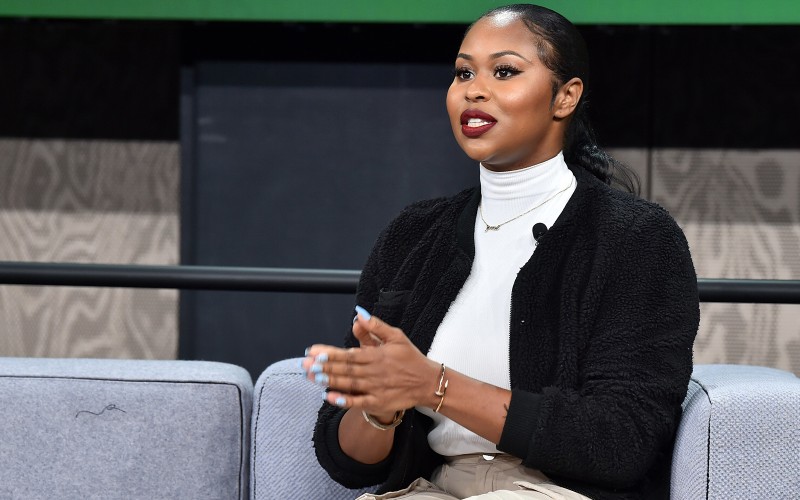Meet the alum making fashion more sustainable and inclusive

A decade ago, Jessica Couch (MPS ’16) found herself at Steiner Studios in Brooklyn at a video shoot, working under designer Brandon Maxwell’s assistant during a session with Lady Gaga. Couch had recently moved to New York, after graduating from college in North Carolina, and was sleeping on her sister’s couch while juggling a couple of unpaid internships in the fashion industry. On set, she noticed two things: Stylists had a lot of influence, but they weren’t paid commensurately. And waste was endemic in fashion, with heaps of samples discarded daily.
Couch’s latest venture is her attempt to solve both problems. This month, with cofounder Bo Hu Yang, she launched Looks.Clothing, a platform that uses artificial intelligence to help users discover looks based on their size and preferences while democratizing influencer marketing. “Now anyone can post items and benefit from commissions directly,” Couch said. “You don’t have to look a certain way, have 10,000 followers or be a celebrity.”
The platform, which is in its beta phase, is kicking off by empowering both sales associates and stylists before expanding to what Couch calls “stylish people” and eventually the general public.
By gathering detailed data on what users are buying, Couch also hopes the platform will help the fashion industry better tailor products to the needs of real consumers. Right now, brands are “designing in the dark,” leading to massive waste: $64 billion in returned items, $50 billion in unsold inventory and 17 million tons of discarded textiles in the U.S. alone, according to Couch. Overproduction and inefficiency not only hurt retailers, but also depress wages for factory workers and harm the environment, she says.
“Properly balancing supply and demand is the best way to solve the sustainability issue and make fashion more equitable,” she said. “Our platform is the only way to do this.”
Couch got her start in apparel as a retail associate at Nordstrom, where her scientific approach to styling made her a top seller: “I have all these data points of what we have — the fabric, the colors — then I have data points on the customer coming in, so I can merge those two,” she said. With a loan from her parents, Couch then launched an online boutique called Luxor + Finch, achieving a return rate of less than 8% through virtual styling methods that carefully matched people with products.
Couch wanted to use her data-driven mindset to address problems in the fashion industry at a larger scale. In 2014, she enrolled in the Cornell Human Ecology (CHE) master of professional studies program, where she studied fit technology integration. Couch says courses on human intelligence, design thinking and business, as well as conducting her own research, gave her a deeper understanding of areas such as product development, quantitative analysis and influence. Her thesis explored how customers view the shopping experience and what motivates them to make a purchase. “Cornell changed my world completely — it was a magical time,” Couch said. “Every class I took is still so relevant for what I do.”
Susan P. Ashdown, an emerita professor in CHE who worked closely with Couch, was drawn to her drive and relentless focus on customers. “I was attracted to Jessica’s connection with the people wearing clothing as real people, not an imagined target market,” Ashdown recalls. “She also had energy, ambition and a belief in herself, which is always a winning combination.”
Soon after graduating, Couch sketched out a vision for what became Looks.Clothing on sticky notes. “I knew what problem I needed to solve, but I didn’t know how to put all the pieces together,” she said.
Couch spent a few years as an independent consultant before co-founding Fayetteville Road, a management consulting firm, in 2018. The agency used technology and a keen ear for consumers to help retailers and brands better serve niche markets, particularly underserved groups and people of color. Through an initiative called WOC Worldwide, the firm hosted brunches and other events for women of color around the country to understand their needs around fashion, beauty, health and wellness.
After five years, Couch dissolved the firm in July to focus on Looks.Clothing. “I wanted to get back to my roots and solve the biggest issues in fashion through technology,” she said. “I felt a responsibility to create something that can reduce waste, not just help people look good. What I am building is the future of commerce.”
Couch encourages other entrepreneurs to follow their intuition, even when their path doesn’t make sense to others. “It can be intimidating when you’re innovative, because people won’t understand what you’re doing,” she says. “If you have a gut instinct and a vision, block everything out and trust in it. Eventually, you’ll find a way.”